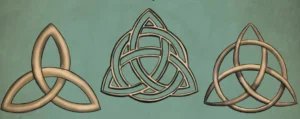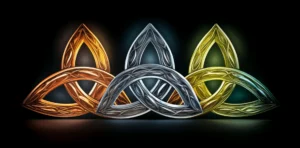The Celtic Trinity Knot, also known as the Triquetra, is a captivating symbol with an intricate design and profound implications. In this comprehensive article, we’ll explore the Origin and Meaning of the Celtic Trinity Knot, delve into the Trinity Knot: Find out its Origin and Meaning and discuss the Trinity Knot / Triquetra Symbol: Meaning + History. You’ll leave with a deeper understanding of what Trinity Knot Meanings can signify across different contexts.

Origin and Meaning of the Celtic Trinity Knot
The Celtic Trinity Knot is an ancient symbol with roots that go back to Celtic and early Pagan traditions in Europe. Found in metalwork, stone carvings, and even ancient manuscripts, this symbol has stood the test of time. The Origin and Meaning of the Celtic Trinity Knot focus on its intricate design that forms three distinct but interconnected points.
Understanding the Symbolism
Delving deeper into what the Celtic Trinity Knot means, it’s important to consider its inherent symbolism. The key to understanding the Trinity Knot / Triquetra Symbol: Meaning + History is the concept of “threeness in unity.” In essence, the three separate arcs in the design represent distinct elements that are inherently connected, forming a unified whole.
Variations in Symbolism: Trinity Knot Meanings Through Different Lenses
The specific elements symbolized by the three points can vary greatly, ranging from life, death, and rebirth, to earth, water, and sky. These various Trinity Knot Meanings allow the symbol to be versatile and relevant in multiple contexts. You can also read 16 Best Holiday Gifts for Your Best Girlfriends.
Trinity Knot: Find out its Origin and Meaning in Cultural Contexts
The Pagan Perspective
In Pagan tradition, the Trinity Knot often represents the three aspects of the goddess—Mother, Maiden, and Crone—or the elemental realms of earth, sea, and sky.
The Christian Interpretation
With the spread of Christianity, the Origin and Meaning of the Celtic Trinity Knot underwent a transformation. In Christian contexts, the Trinity Knot symbolizes the Holy Trinity: the Father, the Son, and the Holy Spirit.
Beyond Cultural Boundaries
The fluidity of Trinity Knot Meanings allows for its use and interpretation to transcend religious and cultural lines. The symbol has found its way into modern pop culture, tattoo art, and various organizations.

The Trinity Knot / Triquetra Symbol: Meaning + History in Modern Times
In contemporary times, the Celtic Trinity Knot remains a popular symbol in jewelry, tattoos, and decorative arts. If you were to find out its Origin and Meaning today, you’d discover that it often symbolizes unity in diversity, balance, and the interconnectedness of life’s various facets.
Making Sense of What the Celtic Trinity Knot Means Today
The symbol serves as a contemporary testament to human interconnectedness and balance, embodying multiple Trinity Knot Meanings depending on the individual’s belief system or cultural background.
Conclusion
As we have explored the Trinity Knot: Find out its Origin and Meaning, it’s clear that this symbol has a rich tapestry of interpretations. Whether rooted in ancient Pagan traditions, Christian adaptations, or more universal themes of unity and balance, the Trinity Knot / Triquetra Symbol: Meaning + History continues to resonate across cultures and belief systems. Understanding the Origin and Meaning of the Celtic Trinity Knot enriches our appreciation for this iconic symbol, making it more than just a beautiful design but a representation of various aspects of life and spirituality.


